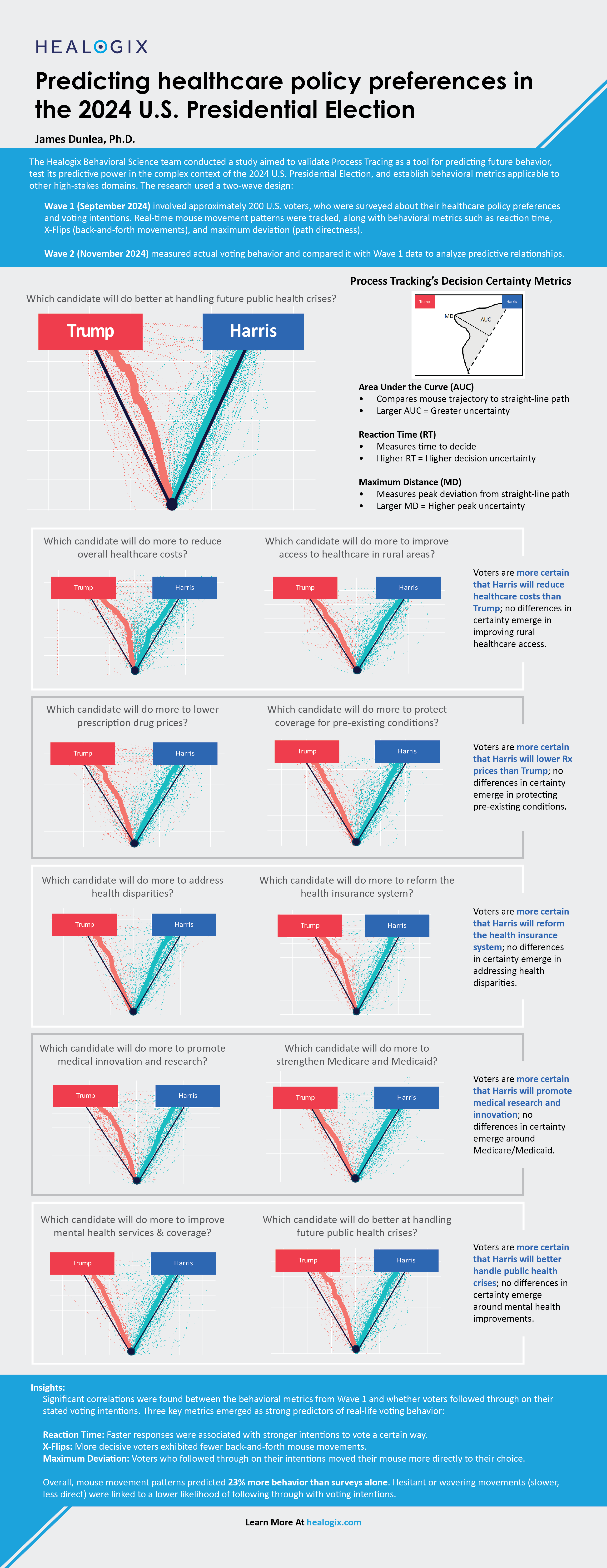Predicting Healthcare Policy Preferences In The 2024 U.S. Presidential Election
December 30, 2024
Human decision-making is complex, especially surrounding high-stake domains such as a presidential election. Traditional methods of assessing decision-making, like self-reports and reaction times, typically cannot account for personal biases and often provides only a single data point for each decision, failing to capture how conflict might evolve and resolve over the course of making a choice. These limitations inhibit the ability to capture the dynamic nature of decision-making, and has made it difficult to test more sophisticated models of decision-making that propose specific temporal dynamics.
To address this, the Healogix Behavioral Science team conducted a two-wave study to explore decision-making conflicts in a high-stakes context: predicting voter behavior in the 2024 U.S. Presidential Election. Using Process Tracing, an advanced form of mouse-tracking, the study tracked real-time cognitive processes to reveal the complexities of voters’ decisions. By recording mouse movements, key metrics such as reaction time, maximum deviation, and X-flips quantified decision conflict, providing deeper insights into the resolution of conflict and the likelihood of follow-through on initial voting intentions.
The Process Tracing approach captured behavioral signals that traditional methods missed, explaining 23% of whether voters followed through on their stated intentions. This case study demonstrates how Process Tracing offers a dynamic, real-time understanding of decision-making, providing valuable predictive power and opening new avenues for studying consumer behavior and decision-making in other high-stakes domains.

James Dunlea, Ph.D.
Kate Evans Named CEO of Healogix
We are thrilled to share that Kate Evans has been promoted to CEO of Healogix!
Kate’s exceptional leadership and unwavering dedication have been truly inspirational. During her more than 17 years at Healogix, her commitment to excellence has consistently driven our company forward, and we are excited to see where her leadership will take us next.
Please join us in congratulating Kate on this well-deserved promotion! We are confident that under her guidance, Healogix will reach new heights and achieve even greater success.
Congratulations, Kate! Here’s to many more milestones and achievements ahead.

B-Sci Bite: How do consumers think about natural (vs. synthetic) remedies for treating illness?
Consumers often are faced with choosing between natural and synthetic (a drug artificially manufactured in a laboratory) medications. How do consumers think about each option? Behavioral science research suggests that consumers generally prefer natural to synthetic medications, and that this preference is stronger when the goal is to treat psychological rather physical conditions.
What explains this pattern? Follow-up research suggests that consumers are more concerned about their “true selves”–who they are at their core–being altered when treating psychological conditions. They perceive natural drugs to be less likely than synthetic drugs to alter their “true selves”; in turn, they prefer natural remedies when treating psychological conditions.
These findings have implications for how people engage with their health. Possible consequences of consumers’ pro-natural preference include disregarding medical advice, prematurely discontinuing prescriptions, and avoiding help from psychiatrists altogether. To counter this, healthcare providers and pharmaceutical companies should educate on the safety of medications while positioning them as facilitating one’s authentic self rather than compromising it.
READ FULL B-SCI BITE POST HERE
Questions? Or simply curious? Get in touch!
James Dunlea, Ph.D.
Head of Behavioral Science
Maximizing Pharmaceutical Marketing Impact: Leveraging Understanding of Loss Aversion Bias
Understanding loss aversion bias is crucial for effective pharmaceutical marketing research. This cognitive bias, which involves fearing losses more than equivalent gains, shapes perceptions and decision-making among healthcare professionals and patients.
Pharma marketers must consider loss aversion bias in several key areas, including patient adherence, physician prescribing decisions, risk communication, market positioning, and clinical trial participation. By understanding the strength of loss aversion in a given marketplace, tailored
positioning and strategies can be developed.
Crafting messages with appropriate tone and linguistic clarity is vital for effective communication about pharmaceutical products. By emphasizing benefits while minimizing perceived losses, pharmaceutical marketers can enhance their brand’s impact.
At Healogix, we specialize in leveraging an understanding of cognitive biases to uncover meaningful insights. Want to enhance your brand’s impact? Let’s connect!
Revolutionizing Market Research with Healogix’s Memorable Moments™ Methodology
Healogix is transforming market research with our innovative Memorable Moments™ methodology, which utilizes mobile ethnography to capture genuine customer experiences. This approach enables participants to use their smartphones to document real-time interactions, offering a holistic view of their journeys, emotions, and behaviors.
By collecting authentic data directly from the source, Memorable Moments™ bypasses traditional biases associated with surveys and artificial settings. The effectiveness of Memorable Moments™ spans various research objectives, from understanding patient and caregiver experiences to analyzing physician and dentist reactions to new products.
These insights help marketing teams craft strategies that resonate deeply with their target audiences, enhancing engagement and optimizing campaigns. Join Healogix to revolutionize your consumer insights with actionable, real-time data. Let’s connect!
Elevating Pharmaceutical Research with Behavioral Science Expertise at Healogix
Healogix has strengthened its market research by integrating Behavioral Science, led by the new Head of Behavioral Science, James Dunlea, Ph.D., since December 2023. With his extensive experience, James enhances our understanding of the subconscious drivers behind consumer behaviors. This approach enables the development of more effective communication strategies and innovative products that cater to both client and consumer needs.
James’s expertise in social and cognitive psychology helps dissect complex behaviors across patients, physicians, and healthcare administrators. His ability to merge qualitative and quantitative research boosts our insights into consumer preferences and decision-making, enhancing our marketing strategies and product development.
James’s addition promises to transform our pharmaceutical marketing research, making our strategies more psychologically attuned and innovation-driven. For more details on how this approach can benefit your projects, contact Healogix today! Chris Carles James Dunlea
John Taenzler Ph.D. joins Healogix
John Taenzler Ph.D., Senior Vice President o f Oncology joins Healogix! John brings over 20 years of experience in pharma market research and is well versed in Oncology as well as many other therapeutic areas. We are very excited to have John join our team!!
f Oncology joins Healogix! John brings over 20 years of experience in pharma market research and is well versed in Oncology as well as many other therapeutic areas. We are very excited to have John join our team!!
Healogix Headlines Features “Customizing the Adoption Technology Curve”
Healogix Headlines Q4
Read about our COVID-19 Survey Series
To Read Click Here
Want more information on our recent Oncology Covid-19 Podcast?
Click here to find out more
